 Forensic hypnosis is the scientific application of memory enhancement—an investigational aid to law enforcement leads and admissible courtroom evidence. Hypnotic recall assists witnesses to reliably relay hidden details of events and descriptions that aren’t extracted through conventional interview techniques.
Forensic hypnosis is the scientific application of memory enhancement—an investigational aid to law enforcement leads and admissible courtroom evidence. Hypnotic recall assists witnesses to reliably relay hidden details of events and descriptions that aren’t extracted through conventional interview techniques.
In my police career, I’ve had many cases using hypnotic memory enhancement. Several had amazing success.
 I’m fascinated with the human mind. I think modern medicine and psychiatry are just beginning to understand the complexity of how our consciousness works. Hypnosis is a tool to assist in entering our subconscious and unlock the vault where memory is stored. Its magic is the ability to alter the subject’s state of consciousness which is what Shamanism is all about. But, then, Shamanism is for another discussion.
I’m fascinated with the human mind. I think modern medicine and psychiatry are just beginning to understand the complexity of how our consciousness works. Hypnosis is a tool to assist in entering our subconscious and unlock the vault where memory is stored. Its magic is the ability to alter the subject’s state of consciousness which is what Shamanism is all about. But, then, Shamanism is for another discussion.
The best forensic hypnotherapist I’ve had the pleasure to work with is Dr. Lee Pulos of Vancouver, British Columbia, Canada. Here’s how Dr. Pulos explains it.
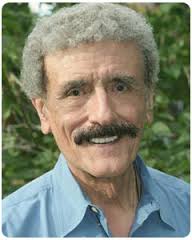 “Hypnosis is a natural state of consciousness that we drift in and out of quite regularly. For example, while driving along a highway and then suddenly discovering that you ‘lost’ several miles without being aware of it. This can also happen during reading when you may notice that you have ‘read’ a chapter or two without being mindful of the content. Hypnosis is basically a technique for focusing consciousness by entering a deep state of absorption. It allows you to shift from your outer to inner awareness and tap deeper levels of consciousness so we can re-educate and reprogram the subconscious with empowering suggestions or beliefs.”
“Hypnosis is a natural state of consciousness that we drift in and out of quite regularly. For example, while driving along a highway and then suddenly discovering that you ‘lost’ several miles without being aware of it. This can also happen during reading when you may notice that you have ‘read’ a chapter or two without being mindful of the content. Hypnosis is basically a technique for focusing consciousness by entering a deep state of absorption. It allows you to shift from your outer to inner awareness and tap deeper levels of consciousness so we can re-educate and reprogram the subconscious with empowering suggestions or beliefs.”
The word hypnosis comes from the name of a Greek god Hypnos, who presided over sleep. In the late1700s, Anton Mesmer brought the technique into popular consciousness in Europe and in 1843 Scottish physician James Braid coined the term hypnotism for the experience that was passing in many circles as animal magnetism.
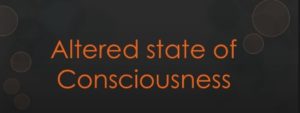 Hypnosis places a person in a trance state that can resemble sleep, but instead is an altered state of consciousness more akin to lucid dreams. Often, people in a trance are quite alert but focused in a way that differs from their normal conscious state. Contrary to popular notions, subjects in a light trance are aware of everything going on.
Hypnosis places a person in a trance state that can resemble sleep, but instead is an altered state of consciousness more akin to lucid dreams. Often, people in a trance are quite alert but focused in a way that differs from their normal conscious state. Contrary to popular notions, subjects in a light trance are aware of everything going on.
 I’ve seen a rough and tough biker-witness under hypnosis who was instructed to play “patty-cake” by clapping his hands on his knees. He couldn’t stop laughing at the fact that he couldn’t control his hands, though he seemed perfectly conscious in a way that ought to have enabled him to resist the instruction. His hands changed to patting his head and stomach at the hypnotist’s instruction. They looked at each other the whole time and even had a conversation with his hands patting about.
I’ve seen a rough and tough biker-witness under hypnosis who was instructed to play “patty-cake” by clapping his hands on his knees. He couldn’t stop laughing at the fact that he couldn’t control his hands, though he seemed perfectly conscious in a way that ought to have enabled him to resist the instruction. His hands changed to patting his head and stomach at the hypnotist’s instruction. They looked at each other the whole time and even had a conversation with his hands patting about.
The trance-state, which has its own ebb and flow, is the result of a trusting and cooperative process between the subject and the hypnotist. It’s not one person controlling another and there’s no way the hypnotist can make the subject do something they would not do while they’re in a normal state, such as an illegal or immoral act.
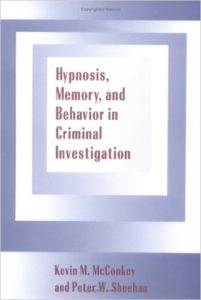 “Hypnosis,” says Kevin McConkey, President of the Australian Psychological Society and co-author of Hypnosis, Memory, and Behavior in Criminal Investigation, “is essentially a phenomenon that reflects genuinely experienced alterations of reality in response to suggestions administered by a hypnotist. The subject’s testimony is what confirms the trance, although susceptibility varies among individuals. Those who are highly suggestive will behave as if going through truly significant cognitive alterations.”
“Hypnosis,” says Kevin McConkey, President of the Australian Psychological Society and co-author of Hypnosis, Memory, and Behavior in Criminal Investigation, “is essentially a phenomenon that reflects genuinely experienced alterations of reality in response to suggestions administered by a hypnotist. The subject’s testimony is what confirms the trance, although susceptibility varies among individuals. Those who are highly suggestive will behave as if going through truly significant cognitive alterations.”
Hypnosis involves concentration that is heightened to the point where one can recall details that seemed to elude that same person in a conscious state. It’s a powerful forensic tool for criminal investigation, although some researchers challenge the notion that hypnosis leads to significant increases in memory.
There are two basic purposes for using forensic hypnosis.
The most common is inducing relaxation when anxiety and stress may obstruct a witness’s ability to recall as much information as possible. The second occurs when retrieval of information from witnesses cannot be acquired through other means.
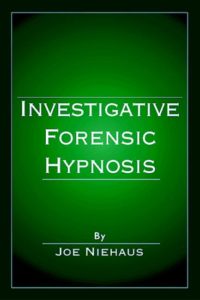 The first court case involving forensic hypnosis was Cornell v. Superior Court of San Diego in 1959. Although forensic hypnosis is mostly used by prosecutors, in this particular court case, it was the defense that used hypnosis as an aid in preparing its strategy. Since then, many famous cases have used hypnosis as an aid, including the Boston Strangler, Ted Bundy, and Sam Sheperd.
The first court case involving forensic hypnosis was Cornell v. Superior Court of San Diego in 1959. Although forensic hypnosis is mostly used by prosecutors, in this particular court case, it was the defense that used hypnosis as an aid in preparing its strategy. Since then, many famous cases have used hypnosis as an aid, including the Boston Strangler, Ted Bundy, and Sam Sheperd.
Currently, no overriding judgment has been handed down regarding the admissibility of evidence achieved through forensic hypnosis and the use of hypnotic evidence varies between jurisdictions. Adding to the reliability problem is that solid evidence can be devalued as a result of unprofessional circumstances in obtaining evidence through hypnosis.
I remember one judge rejecting evidence from a witness who had been subject to hypnotic recall stating “There’s nothing more unreliable than an eyewitness, never mind one who is tainted by hocus-pocus.” One the other hand, I recall another judge being fascinated by the process and readily accepting witness evidence, particularly because the information obtained under hypnosis was corroborated by independent facts.
As in all types of evidence, the key is reliability.
To ensure solid forensic hypnosis used in criminal investigations is not devalued, it’s become standard and vital operating procedure that all hypnosis sessions are video/audio recorded and the session is witnessed by independent observers. To strengthen the case, the hypnosis must be performed by a trained forensic hypnotist.
Before a forensic hypnotist is allowed to begin a session, one very important condition must be met. The subject must be assured that during the hypnotic session no attempt shall be made to elicit any information that is not directly relevant to the investigation. In addition, the forensic hypnotist must also assure the subject that no information retrieved will lead to self-incrimination.
Critics of forensic hypnotism center their attacks on the accuracy and reliability of the evidence that’s obtained. The concern is that suggestion(s) implanted during hypnotism may create false memories through the use of leading questions.
One thing that a forensic hypnotist cannot do, and is never called to do, is to help a suspect confess to a crime. Not only is this impossible, but any confession arrived at through hypnosis would never be admissible in court.
Here’s a true case I investigated where forensic hypnosis for memory enhancement led to a break through in solving the crime. It was conducted by Dr. Lee Pulos.
 In wintery April, a lady was alone in her cabin on a remote gold claim in northern British Columbia. A masked man with a handgun appeared at her door, demanding she hand over her gold stash. She refused. He proceeded to blindfold and hog-tie her, then began torturing by burning her hands and ribs with a red-hot knife heated on her wood stove.
In wintery April, a lady was alone in her cabin on a remote gold claim in northern British Columbia. A masked man with a handgun appeared at her door, demanding she hand over her gold stash. She refused. He proceeded to blindfold and hog-tie her, then began torturing by burning her hands and ribs with a red-hot knife heated on her wood stove.
Now this lady was one tough old bird, as you’d expect a gold miner to be. She later stated she’d worked so hard to build her gold stash that she’d “rather die than turn it over to this asshole.” Realizing his interrogation technique was going nowhere, the bad guy quit in frustration. He set the cabin on fire with her still tied, blindfolded, and left her to die. She was able to wiggle over and boot the door, then crawl outside where she laid in excruciating pain on the snow in sub-zero temperature until her husband returned.
Because this was such a horrific crime, we “pulled the stops”.
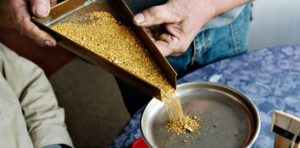 We flew her to Vancouver to undergo hypnosis with Lee Pulos. He was able to extract two things that led to solving the case. One, she recalled the bad guy was using a two-way radio or ‘communicator’, as she called it. Second, he used the term for her gold stash as being ‘squirreled away’.
We flew her to Vancouver to undergo hypnosis with Lee Pulos. He was able to extract two things that led to solving the case. One, she recalled the bad guy was using a two-way radio or ‘communicator’, as she called it. Second, he used the term for her gold stash as being ‘squirreled away’.
 Now knowing an accomplice was involved, we focused the investigation on a neighbor who’d been involved with a gold claim boundary dispute. We identified the suspect as a Hells Angels striker who’d been hired by the neighbor, so we ran a wiretap which caught him using the term ‘squirreled away’. This led to an elaborate, clandestine sting operation resulting in his confession to an undercover agent. He was convicted and got twenty years.
Now knowing an accomplice was involved, we focused the investigation on a neighbor who’d been involved with a gold claim boundary dispute. We identified the suspect as a Hells Angels striker who’d been hired by the neighbor, so we ran a wiretap which caught him using the term ‘squirreled away’. This led to an elaborate, clandestine sting operation resulting in his confession to an undercover agent. He was convicted and got twenty years.
Like I said, I’ve always been fascinated with how the human mind works. One thing I’m positive about—there’s more to consciousness than modern medicine and psychiatry know—except for the Shamans.

Dr. Leslie Gray is a professor at UCLA Berkley and the Core Shaman who’s altered states of consciousness teachings inspired “No Witnesses To Nothing”. Her website is www.WoodfishInstitute.com in San Fransisco.

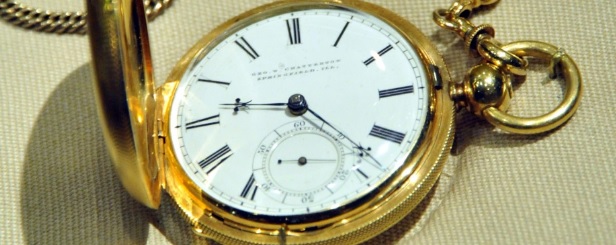

Thanks for his very enlightening post, Garry. I was an NGH Certified Hypnosis instructor and certified regression therapist for 20 years and I attended eye-opening classes in forensic hypnosis given by Marx Howell (Inspector Marx Howell is a 32 year veteran of the Texas State Police, a graduate of the FBI National Academy, holds a Bachelor of Science Degree in Criminal Justice and served in the United States Marine Corps. He started his career as a state trooper in the Traffic Law Enforcement Division and promoted through the ranks to Captain in the Criminal Law Enforcement division and then to Inspector. Marx is a T.C.O.L.E. approved Law Instructor with 53 years Law Enforcement experience and considered one of the leading authorities on the Forensic Application of Hypnosis in the police field).
Very interesting, Paul. Thanks for sharing this!
Such and interesting subject, Garry, and one in which I am quite familiar. I have to say first that everything to bring to us is like a film–so much information, visuals and all. I always look forward to your emails.
As for hypnosis, through my 20s to 40s, I had extreme panic disorder. I got to work daily, but probably had at least 14 panic attacks getting there, leaving, and driving. I fought back. Nothing I was given helped them. I was tired of those with me taking me to emergencies, they were that bad. So I found a well-known, female psychologist who worked with me for almost two years on memories of my horrific childhood from which she said I was disassociating. Finally she suggested the hypnotism. Not only did it work and we discovered my mother tried to drown me as a toddler (which my mother’s sister confirmed after and said no one in the family had wanted to tell me that), but within a short amount of time the panic disorder minimized and stopped. Also, you mentioned lucid dreaming. In the year after stopping the therapy with my psychologist, I started lucid dreaming. Thought I was losing it, but again contacted the psychologist and found out it’s a good thing and gives one an ability to change bad dreams or nightmares. So, thank you for putting this wonderful information out there, which I’m sure will help many people who do not realize this is available to them.
So nice to hear you find the material interesting, Gippy. I’m no expert on hypnotism but it seems to me the forensic use is very small compared to the medical use. I’m aware of hypnosis benefits in treating PTSD and other stress-related maladies. It really about altering the mind into a relaxed state.
Speaking of interesting, you’ve certainly had some interesting life experiences 🙂 Thanks so much for commenting!
Fascinating. But I’m curious how “squirreled away” led to the suspect. It’s not an unusual term, at least, it’s not all that uncommon around here. Maybe it is in Canada?
There’s a bit more to it, Sue. During the bad guy’s work-over on the victim, he used the term “squirreled away” repeatedly. It’s not that common a term up here, but not totally unheard of. He also had a deep and distinctive voice. Once we zeroed in on the neighbor as setting up the rip, an informant came to us (coincidentally) and ratted out the bad guy. Without any knowledge of the crime, the informant said the bad guy had been contracted to recover a gold stash he knew was “squirreled away” (in the bad guy’s words) so we knew we were headed on the right track. Running wiretaps and undercover operations are very costly undertakings and we wouldn’t have gone that route if we weren’t reasonably satisfied we were after the right guy.
It all comes back to the victim remembering under hypnosis that the bad guy used the term “squirreled away” and was talking to someone else on a two-way radio. She didn’t bring these facts out in her conventional interviews.
BTW, the victim had over $100K in gold squirreled away that he never got. She also recovered with minimal scarring from her burns by self-medicating with Vitamin B12 (I think it was) and Alo Vera.
Is Dr Lee Pulos still working, alive?
His website doesn’t exist any more and Twitter, FB is not updated for a very long time.
I don’t know, Peter. I just did a quick web search and don’t see anything recent either. If he’s still with us, he’s getting pretty old by now.